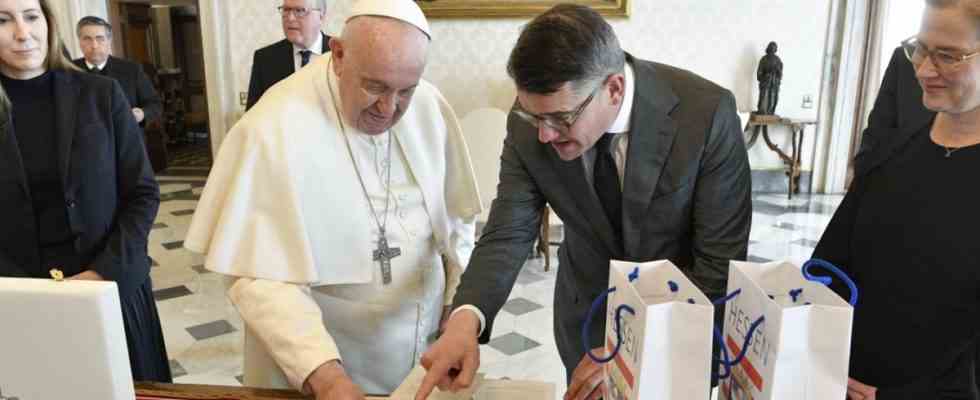It happens that German Prime Ministers visit the Pope. As heads of government of a federal state, you are entitled to a private audience. The Prime Minister of North Rhine-Westphalia has announced that he will be there next week; his counterpart in Hesse, Boris Rhein, preempted him this Thursday.
The pope took half an hour for the one-on-one conversation, from which the CDU politician did not want to quote afterwards. Only this much: The Pope had impressed him, the practicing Catholic, very much. He is well informed and “incredibly committed” to all the topics that have been addressed. And the central topic was, of course, how the German Catholics and the Vatican want to get along better with each other than before.
Rhein is a party insofar as the chairman of the German Bishops’ Conference resides in his state, Georg Bätzing from Limburg, who is a regular and “very valued” dialogue partner for him. Furthermore, the last major conference of the synodal path, which they like to call the “so-called” synodal path in Rome, has just taken place in Frankfurt. So-called because, according to the Roman understanding, the Vatican is ultimately responsible for working together in the church and people here think they know how the relationship between priests, bishops, religious and lay people should be shaped, even without German help.
The conflict is adjourned but not over
Up until the Frankfurt Synodal Assembly, which formally concluded the three-year, often agonizing reform process, it even looked as if “two trains were racing towards each other at top speed,” according to an image commonly used in Roman church circles. Scenarios were played out up to a possible schism in the church. On various occasions, Vatican representatives made it clear that the Curia and the Pope personally would not shy away from tackling the conflict openly if necessary. Now the situation has changed in that Frankfurt has fallen far short of the Vatican’s fears.
Although the majority of German bishops are on the path to reform, they also shy away from conflict with Rome, and the conservative critics of the synodal path are loyal to the Vatican. In Frankfurt it was observed how the Apostolic Nuncio in Germany, Archbishop Nicola Eterović, repeatedly sought dialogue with the bishops, who were known to be opponents of reform. In the end, several texts were decided. After all, women and the non-ordained will soon be allowed to preach the sermon at Holy Mass; the church blessing for same-sex couples should also be officially possible. And the pope is to be asked to examine compulsory celibacy for priests; particularly sensitive issues were postponed.
The pace and sense of mission of the Germans get on Rome’s nerves
What the reformers see as an embarrassing retreat from Rome is still too much for the Vatican. Whereby the topics that the Germans bring up are definitely seen, they are being discussed in many countries. However, the pace and the direction with which the Germans want to renew the church, their independence and their sense of mission really get on the nerves of those in power in the Vatican. The church has more important issues and, by the way, is not in crisis at all, as claimed. The statistics for 2021 have just been published, according to which there are 1.378 billion members, more Catholics than ever before, strong growth rates, especially in Africa and Asia.
Rhein could have experienced a demonstratively relaxed Francis – but he obviously hasn’t. Instead, after his talks with the Pope and Cardinal Secretary of State Pietro Parolin, the German said: “I am firmly convinced that there is still a lot to be said and a lot of communication to be done so that there is no conflict in the Church.” This fits in with other signals coming from the Vatican: they are by no means satisfied. The conflict is adjourned but not over.
An important player on the German side will no longer be able to help in the future as before: Munich Archbishop Cardinal Reinhard Marx, inventor and staunch supporter of the synodal path, has not been reappointed by the Pope to his most important advisory body, the Cardinal Council, which only has nine members . Marx was influential because he wrestled hard on the matter and at the same time, in his affable way, always got on well with Francis. Now he’s out.

